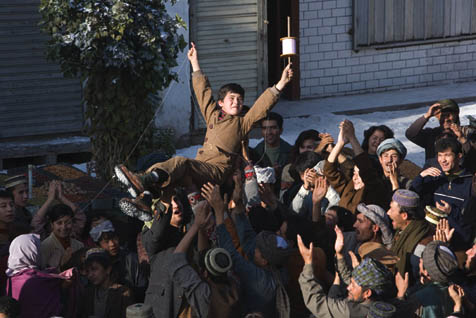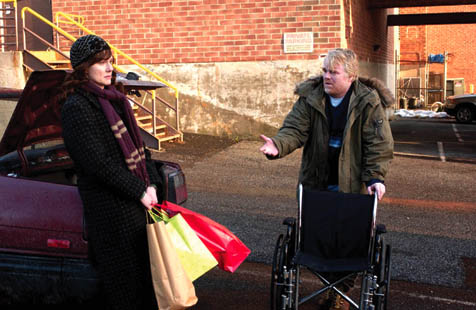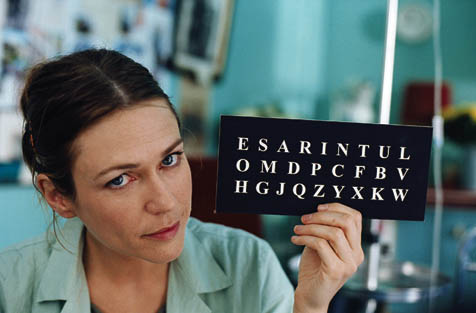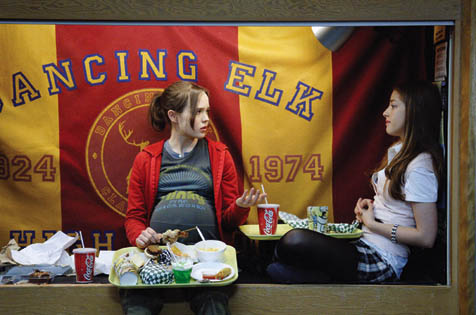Inside The Kite Runner, The Savages, The Diving Bell and the Butterfly, and Juno
A Quadruple Threat of Holiday Hits

Movie studios wait until the end of the year to release their best stuff, so they can capitalize on the many awards being handed out around now. That’s why this coming weekend we’ll see the unveiling of four of the best films of the year: The Kite Runner, based on the bestselling novel by Khaled Hosseini about the bond between two children in Afghanistan; The Savages, about two siblings-played by Philip Seymour Hoffman and Laura Linney-who are dealing with their father’s dementia; The Diving Bell and the Butterfly, an elegiac film about a man’s struggle with his stroke-caused paralysis; and Juno, a hysterical, moving comedy about teenage pregnancy. In the past few weeks, I’ve sat individually with The Kite Runner‘s screenwriter David Benioff, The Savages writer/director Tamara Jenkins, The Diving Bell‘s director Julian Schnabel, and Juno’s director Jason Reitman to discuss their respective films.
David Benioff, screenwriter of The Kite Runner
How involved were you with Khaled, the writer of the novel? He was a wonderful resource. Obviously, I didn’t grow up in Afghanistan and did not grow up knowing the culture at all, so I had many questions while writing the screenplay, and he was always available. Very often in the relationship between the author of the novel and the screenwriter, there can be friction. It can be tense. Khaled was never anything less than a gentleman. This book was his baby, and he gave me the baby for a couple years to take care of. The best comment I received throughout the course of this whole movie [was when] : somebody asked, “Is this line from the book or is this from the screenplay?” And [Khaled] said, “Honestly, I don’t remember which lines are mine and which are David’s.” As an adapter of such a beloved novel, I can’t tell you how much that meant to me.
Were you involved in the [film] shooting in China? I was there when they were shooting interiors in Beijing. One of the incredible things about the movie is that it’s based on a beloved novel by an Afghan-American, directed by a Swiss German, shot in China, and has a cast of Iranians, Iranian-Americans, and French-we had everything. It was international. We had five translators on any given day.
What’s your reaction to the kids who had to be removed from Afghanistan due to fears of retaliation after they participated in the movie? I actually believe this is going to work out for the best for those kids. They were so wonderful in this movie and when they see it, they are going to be so proud of their performances. I hope that eventually-and I don’t think it will be long-that will be the story that will supersede this whole controversy now. Knock on wood with everything I say, but I think they will have all sorts of opportunities they would have never had otherwise. They did such fantastic work, and the movie would have completely failed without them if they hadn’t been as good as they were. I mean, taking three kids who have never been in movies before, never acted before? : If they hadn’t pulled it off, the movie would have been a disaster.

Tamara Jenkins, writer/director of The Savages
What inspired you to write this? I had my own experience with two relatives who were at the end of their lives. They both had dementia, and they were in nursing homes. One of [them] was my grandmother and the other my father, so I had a personal emotional experience that was at the core of writing the story. But that happened 10 years ago in both cases, so it’s something that was an indelible experience, and I think it’s kind of been lodged in my psyche. I’d say five years ago, it started kind of surfacing, and I live around the corner from a nursing home in the East Village of New York. I’m 45, and many of my friends are dealing with issues of elder care, so it started becoming very relevant for me in all different sorts of ways.
This subject is sad but the movie’s very funny. I wanted to add a very specific tone to the movie. I really think that underneath human tragedy, there’s often kind of a human farce happening. And because these characters are so imperfect and flawed and they’re being kind of pushed into doing something so profound and difficult and complicated, it becomes farcical.
There are subtle fairy-tale undertones in the movie, specifically Peter Pan and Hansel and Gretel. That’s in there, for sure. I mean the Wendy and Jon thing-I stumbled on their names [which are the same as two of the children inPeter Pan] by accident and then, when I realized, I thought, “Oh, I like that.” That’s kind of the fun part of writing sometimes, where you just sort of bump into something and you go, “Oh, that’s good.” I like that they were darlings [the Peter Pan children’s last name]-Savages but darlings. : It wasn’t a self-conscious metaphor, but it became very clear and, you know, your unconscious is working at the same time. These adults are lost children, and issues about not being able to grow up are all in there.

Julian Schnabel, director of The Diving Bell and the Butterfly
You did not want to do this movie in English. It had to be in French. What had happened was this movie was greenlighted at Universal, and Johnny Depp was supposed to play the main role. Johnny and I were pretty good friends. : We worked together on Before Night Falls, and we’ve always been very close. He said that if they wanted him to do this movie, I had to direct it. So he got me this job basically, and then he got involved with the Pirates stuff, and he couldn’t shave his beard and he would’ve had to do this in California. But my idea was that he would come to France and be surrounded by French people and speak French. I thought the book stresses so much the location, the hospital, and I went there and it was like the best movie studio you could find. If I wanted to shoot something at 3:30 in the afternoon when the light was great on the other side of the building, I would just go over there and come back and be able to shoot in another part. It’s all right there, and I would be damned if I would have American and English people speaking English with a French accent and have French people watching the movie in English reading French subtitles in France. Something seemed wrong to me. : From the beginning, that was an issue, but after three days of me sitting in Paris, I got a phone call from Jer’me [Seydoux, a producer]. He was a great man, and he was very nice to me. He said, “Okay, you win, it is in French.” And I never heard a word about it since. : I just did whatever the hell I wanted to do, and they were very supportive.
The first 20 minutes of the film is all shot from one point of view. This is pretty bold filmmaking. The thing that made me like [the film’s editor, Juliette Welfling] so much was that she said, “Wow, I like the idea that you are going to keep this going for so long. I hope you keep it going as long as possible.” I didn’t want it to be like acrobatics, where the audience would feel like, “How long is he going to do this?” or where you’d be conscious of that. Normally, when someone talks to the camera, the movie stops. But since everybody is talking to the camera for such a long time, you just feel like this is like all movies. You accept the convention, and you are with him. One thing that I loved is when Emmanuelle Seigner, the mother of his children, looks at him and looks at you. It’s like we are in Gulliver’s Travels, and then this giant head stares at you. It looked like we are in this little jewelry box, and this giant was opening the door and was looking at everyone in the theater.
This movie is about dealing with death, but ultimately, it’s a celebration of life itself. Definitely. It really teaches you how to live in the present.

Jason Reitman, director of Juno
What did you find yourself connecting to in the script? What I liked about the script was the same thing I liked about the book Thank You for Smoking: It took sensitive subject matter, something tricky-something that normally, if it were to be made into a movie, would be made into this sort of after-school special. Instead, [the script] dealt with it quite frankly and with humor and, in doing so, really opened up the conversation. On top of that, it was hilarious. I was laughing at something on every page.
How does it feel to step out of your dad’s [producer/director Ivan Reitman] shadow and be successful on your own? It’s kind of funny, because I think the presumption about second-generation filmmakers is that we’re not that talented. The idea is that if you’re the child of a filmmaker, you’re probably kind of a spoiled brat. You don’t have that much talent. You probably have an alcohol problem. So the bar is actually not set that high. Just in accomplishing a movie, it’s like, “Well done!” So if you can make a pretty good movie, it’s like, “Holy shit!” And I get that response sometimes.
But look, I was scared to become a director for obvious reasons. It was my father who convinced me to become a film director. : I had been making videos and things like that, but when I got to college, I was scared to become a director, so I went pre-med. I wasn’t doing well at all, and my father came to visit and he said, “What are you doing?” I said, “Well, I’m scared. If I become a director, I’ll never have any real success of my own, and I’ll just be compared to you and people won’t really think much of me.” So he told me a great story from about the time he was my age then, which was around 18 years old. He had grown up in Toronto, and he had gone to Montreal and had discovered submarine sandwiches, which I guess had not hit Toronto yet and were apparently very popular in Montreal. He came back to my grandfather in Toronto and said, “Dad! Dad! You’ve got to give me the money to open up a submarine shop in Toronto! They’re delicious. We’ll have lines around the block, and we’ll make a lot of money.” And my grandfather said to him, “You know, Ivan, I’m sure these sandwiches are very good, and if I gave you the money and we opened up a submarine shop, we could make a lot of money, and your mother and I would be very proud of you. But I don’t think there’s enough magic in it for you. I think you need to follow your heart.”
So he went to college and became a music major. He started a film club. And he became one of the most successful comedy directors of all time. After telling me the story, he told me, “You know, Jason, there’s no more noble job in the world than becoming a doctor. And if you became a doctor, your mother and I would be over the moon, we’d be so proud of you. But I don’t think there’s enough magic in it for you. I think you’re a storyteller. I think you have to follow your heart.”
It was that advice that convinced me to come back to Los Angeles. I started making short films, and I became a filmmaker.



